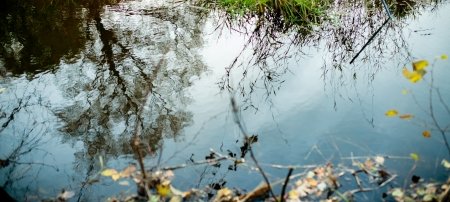Daisuke Minakata Wins Powe Award from ORAU
One of the greatest needs facing mankind today is the safety and availability of water. Water scarcity driven by climate change and other factors presents major challenges to next-generation water infrastructures dealing with both planned and unplanned wastewater reuse.
A group of researchers, led by Michigan Technological University’s Daisuke Minakata, is developing innovative physical-chemical water treatment technologies and predictive tools using novel computational techniques.
For his efforts, Minakata has received a prestigious national award. Minakata, an assistant professor of civil and environmental engineering, has been named a winner of a 2015 Ralph E. Powe Junior Faculty Enhancement award in the discipline of engineering and applied science.
The Powe Award, given annually by the Oak Ridge Associated Universities (ORAU) in Tennessee, recognizes junior faculty for their outstanding work in engineering and applied science; life sciences, mathematics and computer science, physical sciences, policy management or education. The awards provide seed money for research and are intended to enrich the research and professional growth of young faculty and result in new funding opportunities.
In his work, Minakata has been focusing on advanced chemical oxidation technologies called advanced oxidation processes (AOPs) that weaken known and emerging chemical compounds. At Michigan Tech, Minakata and colleague Mark Rouleau, an assistant professor of social sciences, have been developing a model that predicts the fate of the organic degradation byproducts, using a sophisticated computational approach.
“I greatly appreciate this honor and all the support I have received at Michigan Tech," Minakata says. He’s confident of the importance of his ongoing research projects. “Anthropogenic chemicals (ones resulting from the influence of human beings) are present in water everywhere, and unfortunately many of these are not effectively treated by conventional water and wastewater treatment processes. Many anthropogenic chemicals are not biodegradable and are discharged into the environment via wastewater discharge.”
Minakata says this affects natural environmental waters like the Great Lakes and people living downstream. He adds that it is especially critical in arid areas because of the urgent need for water reuse there. “Advanced water treatment technologies and assessment tools need to be developed and applied in engineered systems,” he explains “There are hundreds of thousands of chemicals in commercial production use and less than a hundred chemicals regulated by the EPA, so the need for computational predictive tools is obvious.”
Of the Powe Award, David Reed, Tech’s vice president for research says, “this is a highly competitive award, and I’m thrilled that another Michigan Tech faculty member has been selected.” Minakata is the third Michigan Tech faculty member to receive the award in the past five years. Audrey Mayer with a dual appointment in Social Sciences and the School of Forest Resources and Environmental Science, won the award in 2011, and Durdu Guney, an assistant professor in Electrical and Computer Engineering received the award in 2012.
Michigan Tech is a member of a consortium of more than 100 colleges and universities that comprise Oak Ridge Associated Universities, based in Oak Ridge, Tenn. Reed is vice president of ORAU's Board of Directors.
Michigan Technological University is an R1 public research university founded in 1885 in Houghton, and is home to nearly 7,500 students from more than 60 countries around the world. Consistently ranked among the best universities in the country for return on investment, Michigan's flagship technological university offers more than 120 undergraduate and graduate degree programs in science and technology, engineering, computing, forestry, business, health professions, humanities, mathematics, social sciences, and the arts. The rural campus is situated just miles from Lake Superior in Michigan's Upper Peninsula, offering year-round opportunities for outdoor adventure.




Comments